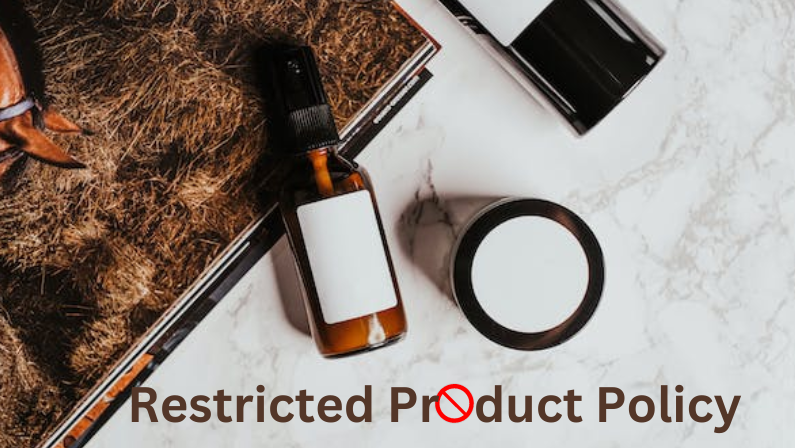Selling on Amazon is a great opportunity for sellers to reach a wide audience and grow their business. However, this privilege comes with a responsibility. Amazon strives to provide the best customer experience by placing strict policies to ensure that products sold on the platform meet certain standards and are safe for customers to use.
If you have received notice that your products violate Amazon’s restricted products policy, it is important to act immediately. Ignoring the notice or continuing to sell the restricted product can result in a permanent ban from the platform.
In this blog, we will discuss the steps you can take to appeal against restricted products policy violation and what you need to know to ensure a successful outcome.
What is an Amazon Seller Restricted Product?
An Amazon Seller Restricted Product requires platform approval due to legal, safety, or quality reasons. Compliance proof, such as for products claiming to be made in a certain country may be necessary. Restrictions vary by country based on national laws—some nations restrict alcohol or gambling sales. It’s vital to note that the lists of restricted categories and products are dynamic and subject to change. Staying updated is crucial for compliance.Why Does Amazon Sometimes Restrict and Remove Products?
To maintain trust, Amazon rigorously enforces policies by monitoring and blocking listings that violate terms of service. Restricted items include:- Illegal or potentially illegal products
- Sexual materials
- Harmful substances like tobacco and alcohol
- Intellectual property infringements
- Restricted media
What Are Amazon Restrictions?
Amazon imposes various restrictions, focusing on categories, products, listings, and brands. Sellers need to be aware of these limitations to ensure compliance. Here’s a breakdown:1. Restricted Categories on Amazon
Certain FBA categories and sub-categories demand approval before listing products. In the U.S., examples include Postage Stamps, Collectible Coins, Fine Art, Jewelry, Music & DVDs, Services, and more.2. Amazon Restricted Products
Here are key categories with restricted products, and they must go through Amazon’s approval process for certain items:- Alcohol
- Animals & animal-related products
- Art – fine art
- Art – home decor
- Automotive and powersports
- Composite wood products
- Cosmetics & skin/hair care
- CPAP cleaning and disinfecting devices
- Currency, coins, cash equivalents, and gift cards
- Dietary supplements
- Drugs & drug paraphernalia
- Electronics
- Explosives, weapons, and related items
- Export controls
- Food & beverage
- Gambling & lottery
- Hazardous and prohibited items
- Human parts & burial artifacts
- Jewelry & precious gems
- Laser products
- Lighting
- Lock picking & theft devices
- Medical devices and accessories
- Offensive & controversial materials
- Pesticides and pesticide devices
- Plant and seed products
- Postage meters and stamps
- Recalled products
- Recycling electronics
- Refrigerants
- Strike anywhere matches
- Subscriptions and periodicals
- Surveillance equipment
- Tobacco & tobacco-related products
- Warranties, service plans, contracts, and guarantees
- Upholstered furniture, bedding, & other quilted products
Consequences Of Violating the Restrictions
Violating Amazon’s restrictions carries significant consequences that can impact your selling privileges and account. If you breach these restrictions, Amazon may take the following actions:- Cancel your listing: The specific product listing that violates restrictions may be cancelled.
- Limit your listing privileges: Amazon may impose restrictions on your ability to create new listings.
- Suspend your account: In more severe cases, your entire seller account may be suspended.
- Ban your account: Repeated or egregious violations may lead to a permanent ban, resulting in a complete loss of access to the Amazon platform.
How to Avoid Accidentally Selling Restricted Products Policy Violations Amazon
To steer clear of unintentionally selling restricted products on Amazon, consider these steps:Familiarize Yourself with Product Regulations
While memorizing every legal detail isn’t necessary, understanding the laws and regulations in the product categories you sell is crucial. Particularly in regulated areas like food, cosmetics, or dietary supplements, being well-versed in the relevant rules is vital to comply with both legal and Amazon’s requirements.Seek Legal Counsel
Laws can change, and to stay ahead, having legal counsel is wise. A designated lawyer can help you stay informed about evolving laws and regulations, ensuring you adapt quickly to any changes.Obtain Approval for Necessary Products
For certain product categories, you can list restricted items with prior approval from Amazon. Ensure you follow the necessary steps to seek approval before listing and selling these items on the platform.Stay Informed About Recalls
Keep a vigilant eye on product recalls. If a product you sell is recalled, it is your responsibility to be aware of it and promptly remove listings for any unsafe versions of the product.Promptly Remove Restricted Listings
In the event of an accidental listing of a restricted product without Amazon’s permission, act swiftly. Instead of marking it as “out of stock,” remove the listing entirely from the site to rectify the mistake promptly. Following these five practical steps will help you navigate Amazon’s rules effectively and prevent inadvertent violations.Step-by-Step Process for Amazon Seller Account Recovery
Dealing with issues on your Amazon Seller account? Use these easy steps to recover successfully.- Identify the Violation Reason: Determine the specific reason for the restricted product violation.
- Review Amazon Rules: Thoroughly examine Amazon rules related to your case for a comprehensive understanding.
- Resolve the Violation: Take decisive actions to rectify the violation, such as deleting or updating the restricted listing.
- Prevent Future Violations: Proactively address potential violations by reviewing and enhancing other listings. Remove prohibited claims and add information for compliance.
- File a Thoughtful Appeal: Submit a well-crafted appeal that includes an apology for the violation.
- Develop a Clear Action Plan: Create a transparent and reassuring plan of action with concise bullet points.
- Submit the Plan: Send the plan of action to Amazon and patiently await their response.
Turn Setbacks into Comebacks – Get Back to Selling with Seller Appeal Now
When selling on Amazon, remember that certain products and categories require permission to be listed. These restrictions vary by marketplace, so ensure your product doesn’t fall into a restricted category. Trust us to guide you through the appeal process by ensuring a swift and effective resolution to get your business back on track.Contact us now.Contact Us
Looking for effective Amazon seller account reinstatement solutions? You’re in the right place! We’ve helped dozens upon dozens of sellers get their accounts back in excellent standing in record time.
Feel free to contact us today to learn more about our services and how you can benefit.




